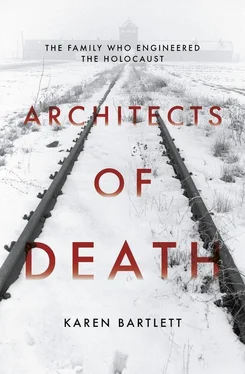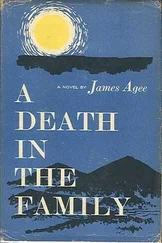In response, Prüfer states he stands by his account and that he would like to ask Braun two direct questions:
Does Braun remember the following incident? In the summer or autumn of 1942, we received the second order from the SS construction management unit at the Auschwitz concentration camp for the construction of five three-muffle furnaces for Crematorium III in Birkenau. Since the written order did not specify a priority level or the sequence in which the work should be carried out, I told Braun about the order when I met him in the company secretariat, and showed it to him. Braun immediately went with me to see the company’s planning department manager Mersch, with whom we then reached an agreement on the matter. On our way to Mersch’s office, Braun asked me the following question in jest, or more specifically, he stated in a jokey fashion: ‘Boys, is there anyone else to burn there?’ I replied in similarly jokey fashion.
Secondly, Prüfer says:
Does Braun remember that in early 1942, the company was visited by a SS officer from Berlin who wanted to negotiate the construction of new cremation furnaces for the SS? The company boss Ludwig Topf called a meeting to discuss this, in which Braun, Mersch and the SS man participated.
At this meeting it was said that the company was fully occupied with the fulfilment of urgent orders for spare parts for military aeroplanes and could not accept any new orders from SS organs for the construction of cremation furnaces.
In response, Braun simply states that he is ‘unable to recall these incidents’. The following day, when Gustav Braun’s solo interrogation resumes, he appears to have realised the futility of maintaining his denial. Braun now states that while he did not oversee plans for the crematoria, he was aware of their existence:
I’m not claiming I didn’t know anything about them. Whenever the company had a major order, the company boss Ludwig Topf, or his co-owner Ernst Topf, would inform me of it and we would agree an achievable deadline.
In individual cases I was consulted about things such as deadlines and stocks of materials for various orders. The orders received from customers were processed by the company’s technical departments. In addition, as operations director I carried out briefings of the foremen every morning, in the course of which their work for the next few days was discussed. This was based on the requirements arising from the current status of the work that needed to be done for individual orders, which the planning department had already passed to the workshops.
These briefings were also attended by the manager of the production planning department, who passed the orders to the workshops and managed the deadlines for their completion. Thus I was always informed about the company’s operational plans, even though I was not [officially] informed about the plans created by the general planning office.
The interrogator responds: ‘So that means you were informed that Topf and Sons had accepted and carried out orders from the SS organs for concentration camps?’
Braun says: ‘Yes, as operations director I knew that the company had accepted and carried out orders for the Buchenwald, Dachau and Auschwitz concentration camps.’
Braun goes on to admit that these orders were for crematoria and that, as operations director, he provided the space in the factory to assemble the furnaces, as well as arranged for metal workers to complete the installation. In the final part of his confession he states: ‘Under my directorship, the Topf and Sons factory produced ventilation systems with inward and outward ventilation which I later learned had been installed in the gas chambers.’
‘Why did you deny these facts during your head-to-head encounter with Kurt Prüfer?’ the interrogator asks.
Braun responds: ‘Because I couldn’t remember clearly and also I was afraid that admitting it would [make things worse for me]. After the head-to-head I thought about it all and decided to tell the truth here.’ [131] Final Soviet interrogation of Gustav Braun, Landesarchiv Thüringen - Hauptstaatsarchiv Weimar.
As his interrogation shows, Braun always maintained that he was initially unaware that Topf and Sons were producing ventilation systems for Auschwitz-Birkenau that were intended for the mass murder of millions in the gas chambers. Yet, the evidence of the Topf and Sons internal memo of 1943, referring to the ‘gas cellars’ at Birkenau, contradicts this.
In addition to the charges laid against him relating to his knowledge of the production of machinery for the crematoria and gas chambers of concentration camps, the Soviet authorities also questioned Braun rigorously over his role reporting on company activities to the Gestapo, and his treatment of foreign labourers. As Annegret Schüle points out in her book on Topf and Sons, it is difficult to single Braun out for his relationship with the Gestapo – all companies were required to have a surveillance officer and Braun was appointed to this role by Ludwig Topf.
Similarly, there is no evidence that Braun mistreated the foreign workers who came under his area of responsibility as operations director at Topf and Sons. Braun claimed that he had intervened on their behalf when they complained about poor food provision in 1943, and Udo Braun says some of the forced labourers went to the Braun house to say goodbye at the end of the war.
At the end of his interrogation, Braun ‘confessed’ to the charges against him and was sentenced to twenty-five years’ hard labour – as were Kurt Prüfer and Karl Schultze. As an engineer, Braun was sent to work on the railway line 428 km south of Moscow at Kuybyshev. A fellow German prisoner reported that, even in an international group of highly skilled workers, ‘his work is the best’. After nine years, Braun was released and returned to Erfurt in October 1955.
Udo Braun remembers that ‘Those nine years were horrible for our family. I was the son of a war criminal. Nobody said that directly to me, but they insinuated it by not letting me go either to secondary school or to university.’
During his father’s absence, Udo had stepped in to offer his family emotional and financial support – particularly his mother, whom he adored. In 1955, Udo was working in the Wismut mines to earn money for the family.
One day I received a telegram: ‘Can you come home, please. Father is back.’ I took the telegram to the Russian shift manager. He was very decent and gave me time off. He knew I always met my quota, which was very important to the Russians. So I got a week off to go home. My brother met me at the train station and showed me a passport photo of my father. He told me, ‘This is how he looks.’ I was shocked.
The Gustav Braun who stepped off the train was, in his son Udo’s eyes, a broken man.
When I got home there was a man standing in front of me who resembled my father. By now I was a big lad, built like a brick shithouse, and he couldn’t cope with me. And I couldn’t cope with him. Our communication was dire. Neither of us knew what to say. I didn’t even know how to address him. Should I call him ‘Papa’? Or ‘Father’? ‘Papa’ was customary in our house. ‘Mutti’ and ‘Papa’. But I just couldn’t say ‘Papa’. Once I very nearly addressed him with ‘Sie’ [formal address for older strangers].
For the rest of Gustav Braun’s life, he never discussed his work for Topf and Sons, or his time in Russia, with his son.
I missed out on vital years. I was nine when he ‘went away’ to Russia. In his papers, he used to refer to his time in Russia as ‘a change of scenery in the USSR’. Otherwise he wouldn’t mention a single word about it. And it wasn’t like anyone would have said to him ‘Come on, tell us all about it.’ No way. He once told me that he’d been imprisoned with criminals, and that sometimes they were forced to sleep with a big plank of wood chained across their legs. So that was pretty drastic. But when the Russians realised what he could do, they moved him to an engineering office where he could work on construction projects and he did much better there.
Читать дальше












